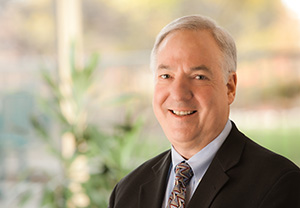June 1, 2015:
A conversation with Kenneth H. Cowan, MD, PhD, director of Fred & Pamela Buffett Cancer Center (University of Nebraska), which is a member of the Big Ten Cancer Research Consortium (Big Ten CRC):
Q: How do you think cancer research will change in the next 10 or 20 years?
Cancer research will move toward precision cancer medicine. Using genomics and other new diagnostic tools, we will be able to employ precision medicine to customize therapies, care for each cancer patient individually, and ultimately improve outcomes. We are investing more efforts into personalized treatments including a partnership with IBM to conduct early testing and feedback for IBM’s Watson Genomic Analytics program. In minutes, the program identifies relevant mutations and potential drugs that may be considered in a treatment regime – all based on the patient’s genomic profile and the specific mutations. The Fred & Pamela Buffett Cancer Center is one of 14 leading cancer institutes to partner on the project. We’re really proud to have this program as part of our research and treatment planning options.
Q: What does translational science look like within your institution and in your collaboration with other Big Ten CRC member institutions?
Our translational science is well developed now with a team of scientists solely devoted to researching cancer and drug development. It is spurring new and innovative approaches to prevention, early detection, diagnosis, and treatment of cancer. In 2017, when we open the new cancer center, it will look even better as we will have lab scientists and clinical providers in one single location that is designed to spark collaboration and discovery. We also are working with all of the Big Ten CRC institutions to develop investigator-initiated early phase clinical trials and develop collaborative research programs.
Q: In what ways is your institution involved in expanding access to clinical trials throughout the communities you serve?
The Fred & Pamela Buffett Cancer Center is a joint venture of the University of Nebraska Medical Center and its clinical partner, Nebraska Medicine, and both have a strong presence in the region. We work closely with affiliate hospitals and physicians across the state of Nebraska and the Midwest to provide the needed access to clinical trials for the communities we serve. We also have formed partnerships in rural communities in our state and region to expand access to our clinical trials.
Q: How is the Big Ten CRC unique from other research consortia in which you participate?
The Big Ten CRC provides a profound opportunity to foster career development for junior faculty. It also provides the unique opportunity for more seasoned faculty to advance their research programs.
About the Big Ten Cancer Research Consortium: The Big Ten Cancer Research Consortium creates a unique team-research culture to drive science rapidly from ideas to treatment-changing paradigms. Within this innovative environment, today’s research leaders collaborate with and mentor the research leaders of tomorrow with the unified goal of improving the lives of all patients with cancer.
About the Big Ten Conference: The Big Ten Conference is an association of world-class universities whose member institutions share a common mission of research, graduate, professional and undergraduate teaching and public service. Founded in 1896, the Big Ten has sustained a comprehensive set of shared practices and policies that enforce the priority of academics in the lives of students competing in intercollegiate athletics and emphasize the values of integrity, fairness and competitiveness. The broad-based programs of the 14 Big Ten institutions will provide over $200 million in direct financial support to almost 9,500 students for more than 11,000 participation opportunities on 350 teams in 42 different sports. The Big Ten sponsors 28 official conference sports, 14 for men and 14 for women, including the addition of men’s ice hockey and men’s and women’s lacrosse since 2013. For more information, visit www.bigten.org.

















Subscribe to the Big Ten CRC Newsletter X
X Facebook
Facebook YouTube
YouTube